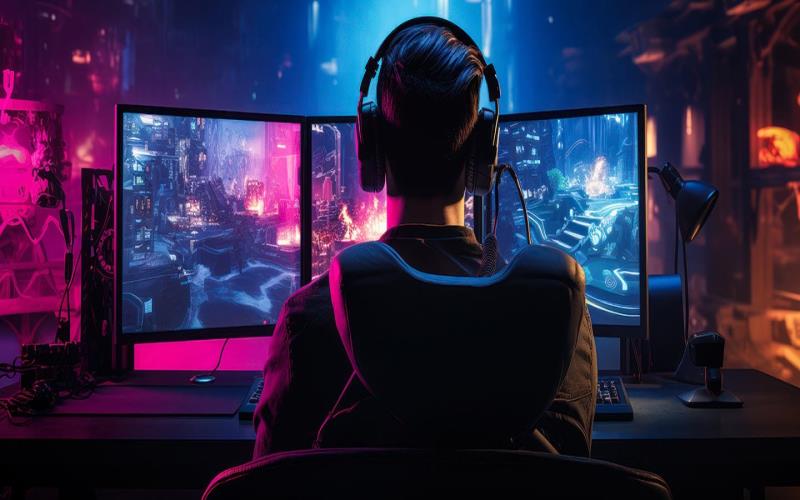Imagine the thrill of sitting at a virtual poker table, your heart racing as you contemplate your next move. With a perfectly timed bluff, you could be well on your way to glory in the exciting world of online poker. Whether you’re a seasoned pro or a curious newbie, this guide will make becoming a pro at online poker not only an enjoyable experience but also a game you can master.
In the following sections, we’ll take you on an awesome journey through the essentials of online poker. You’ll learn the tricks to get started, clever strategies to really amp up your game, and the unwritten rules that govern this digital card room. By the end, you’ll be well-equipped to navigate the virtual felt with confidence and skill.
Welcome to the Exciting World of Online Poker!
Starting out with online poker can be a real thrill, but it can be a bit scary too. Trust me, I’ve been there, and I can’t stress enough how crucial it is to start off right.
Picking the Right Poker Game for You
When I first started playing, I was overwhelmed by the sheer number of options available. After some trial and error, I learned that the key is to look for reputable sites with a strong track record of fair play and timely payouts. Through this list of the best poker apps and top mobile poker sites, I found some great platforms like GGPoker, PokerStars, and 888poker. These offer a range of games suitable for both beginners and experienced players.
Setting Up Your Poker Account
For beginners, here are some essential tips:
- Start with play money games to familiarize yourself with the interface and basic rules without risking real money.
- Learn the basic hand rankings – knowing which hands beat others is key.
- When ready for real money, begin with micro-stakes games to minimize potential losses while learning.
- Take advantage of welcome bonuses or freeroll tournaments for new players.
- Practice good bankroll management: never play with money you can’t afford to lose.
Remember, patience is key when starting out. Don’t get discouraged if you don’t crush it right away. With practice and persistence, you’ll gradually improve your skills and confidence.
Let’s Get Strategic with Your Poker Game
Got the basics down? Perfect! Now, let’s dive into some strategies to really amp up your game.
Understanding Poker Hands
One of the most popular variants is Texas Hold’em. Here are some key strategies:
- Position is power: The later your position, the more info you have about opponents’ actions. Use this to your advantage.
- Be selective with starting hands: Don’t play every hand. Wait for strong starters, especially early position.
- Understand pot odds: Learn to calculate the odds of completing your hand vs. the current pot size for profitable decisions.
- Pay attention to opponents: Look for patterns in betting behavior. Are they aggressive or passive? Do they bluff often?
- Mix up your play: Don’t be predictable. Vary betting patterns to keep opponents guessing.
Betting Strategies in Poker
Bluffing is an essential poker strategy, but it’s often misunderstood. Effective bluffing isn’t about deceiving constantly. Instead, it’s about telling a consistent story with your bets. Bluff when your story is credible and you have outs if called.
Sure, knowing the technical side is key, but don’t underestimate the social side too. I learned about the importance of understanding your opponents from this news article about the Michigan Gaming Control Board. Regulatory bodies actively work to ensure fair play and protect players, so always play on regulated sites within your means.
Playing Nice: The Unwritten Rules of Online Poker
Online Poker Etiquette 101
While the technical aspects are crucial, the social elements are just as important in the online environment without face-to-face interaction. Good etiquette makes the game more enjoyable for everyone.
Here are some key points:
- Respect time limits: Make decisions in a timely manner. Using the full time bank constantly, known as “tanking,” is frowned upon.
- Avoid excessive celebration: It’s natural to feel excited after a big win, but spamming celebratory chat messages is poor sportsmanship.
- Don’t criticize others’ play: Everyone is at different skill levels. Offering unsolicited advice or criticism is generally rude.
- Use chat responsibly: Keep conversations polite and game-related. Avoid offensive language or personal attacks.
- Don’t discuss hands in progress: If you’ve folded, don’t comment until the current hand is complete.
- Be gracious in victory/defeat: Congratulate winners and don’t complain about bad beats.
Handling Wins and Losses Gracefully
These etiquette rules are crucial in prestigious online tournaments like the WSOP events. In high-stakes environments, maintaining professionalism builds a positive reputation.
Remember, behind every avatar is a real person. Treating your fellow players with respect makes the game enjoyable and can lead to valuable connections.
Wrapping Up: Your Awesome Journey in Online Poker
As we’ve explored, getting really good at online poker combines technical skill, strategic thinking, and social etiquette. From choosing the right platform to understanding strategies and maintaining proper etiquette, each aspect plays a crucial role.
Keep in mind, becoming a pro takes time and lots of practice. Don’t get discouraged by setbacks – they’re all part of the learning process. Stay patient, keep studying, and most importantly, enjoy the game.
We encourage you to take the plunge into this exciting world. Start with low stakes, apply what you’ve learned here, and always play responsibly. We’d love to hear about your experiences, challenges, and triumphs in the comments below.
May the flops be in your favor on your journey to online poker glory!

